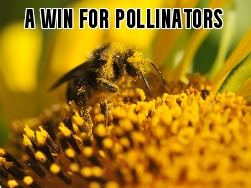📰 EwA News Digest: Utilizing Fin Whale Chirps, A Win for Pollinators, and Frogs' Noise Cancelling Abilities
Caitlin Ball
Caitlin here, with another monthly installment of EwA’s News Digest. In this digest, you will continue to find snippets of the latest environmental news from Massachusetts and beyond.
This month, we will start things off in the ocean. Recently, seismologists have discovered that the loud chirps of fin whales can help us to map Earth’s oceanic crust. Scientists can now use recorded fin whale noises for crustal mapping projects, instead of the loud, artificial sounds previously utilized. Lots of species communicate via sound, and mapping with whale noises is much less likely to disrupt wildlife. Read more about this new breakthrough here.
Unfortunately, one of our motivations for mapping oceanic crust is to find oil reserves. During the last week of February, a large oil spill occurred in the Mediterranean Sea off the coast of Israel and Lebanon. The cause of the oil spill is unclear, but one thing is for certain- the spill has been devastating to wildlife. The New York Times is one of the many news networks that have covered this discouraging story.
Although recent human activity has not bode well for sea creatures in the Middle East, volunteers in Texas are working to save cold-stunned sea turtles by the thousand. Sea turtles are particularly vulnerable to the cold weather, since they are not able to regulate their body temperature. Conservation organizations are hoping to release healthy turtles back into the ocean once it is warmer. Read more about this massive rescue effort at NRP.
Human-wildlife interactions are increasing globally, which has implications for community health. Even after we achieve herd immunity for COVID-19, we need to be prepared for future pandemics. Deforestation and biodiversity loss have increased the occurrence of novel zoonotic disease. Deforestation weakens animals and puts them in closer contact with humans, and biodiversity loss can increase the proportion of species that host pathogens. Read more about factors influencing the jump of zoonotic diseases to humans at Ecology for the Masses.
More locally, in a win for plants and pollinators, Massachusetts passed a partial ban on specific types of pesticides called neonicotinoids. These pesticides are useful because they do not affect vertebrates, but they have negative implications for all insects (not just the targeted pests). Environmental groups in Massachusetts have been advocating for limitations on pesticides for 6 years, and the Massachusetts Pesticide Board subcommittee finally agreed. This new rule will ban the retail sale of neonicotinoids and require that only licensed pesticide applicators apply the pesticide for non-commercial use. Although agricultural uses were not addressed, this is a step in the right direction. Read more at the Cape Cod Times.
As spring approaches and pollinators reappear, EwA is beginning to monitor for the first frog calls. Not only are these beautiful calls a sign of spring in New England, but they also play a role in the mating displays of many different species. The noisy cacophony of sounds from various species may leave us wondering how a female frog picks out one specific male to mate with. Recent research has uncovered that some frogs can inflate their lungs in a way that decreases eardrum sensitivity in certain frequency ranges, making it easier to hear their own species’ calls and tune out the others. Read the original study here, or the synopsis at phys.org.






